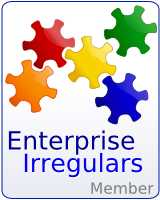Oracle released a new attack ad yesterday that appeared in the Wall Street Journal. While I won't do them the honor of reprinting here, essentially they made three claims (all Q3-05 to Q3-06):
- Oracle grew application revenue 82%, including acquisitions
- Oracle grew application revenue 31% excluding acquisitions
- SAP grew application revenue 14% (they didn't point it out, of course, but this is organic)
Let me address the SAP number first: 14% is the correct, constant currency number. Not adjusted for exchange fluctuations SAP grew app revenue 22%. This is over a very large base as well. SAP US software revenue grew at 25% (15% constant currency); 14 consecutive quarters of software license growth in the US.
Oracle
bought app revenue growth; they are comparing Q3-06 revenue which includes Siebel revenue against Q3-05 revenue which doesn't. Globally, Oracle posted applications revenues of $269 million, representing an increase of 77% over last year Q3 2005. To accurately portray the true increase in revenue, the calculation must include Siebel’s numbers posted from last year. When these revenues are applied, the app revenue growth becomes 19% (not constant currency).
I honestly have no idea where the 31% number comes from. I spent a bit of time yesterday looking through their 10Q and couldn't find it. This is likely to be EBS growth and as such over small base. Difficult to tell as Oracle doesn't break out app revenue by product. Here's what I do know: Oracle application revenue is lower then it was two years ago. Oracle’s stated Q3 06 application license revenue is 35% less than the Q3 04 combined application license revenues of Oracle, PeopleSoft, Retek and Siebel prior to any Oracle acquisition.
While I give them an "A" for misleading advertising, they earn a "F" in mathematics.
UPDATE: It was pointed out to me that there is an amended 10Q in which Peoplesoft is broken out. This sheds some light on the organic app revenue growth:
-Q3 06 Oracle reported $269 million in app revenue. Of this Siebel accounted for $21 million ($0 in Q3 05), Retek accounted for $20 million ($0 in Q3 05), and Peoplesoft $73 million ($31 million in Q3 05). This gives us organic Oracle revenue of $155 million in Q3 06.
-For a year on year comparison using Q3 05, we start with total app license revenue of $152 and subract the $31 million of Peoplesoft app license revenue, giving us $121 million.
-Organic app license growth = ($155 million/$121 million)/$121 million = 28%. Not too shabby on the growth, admittedly, but over a small base. For comparision purposes, SAP
US software revenues were $200 million in the comparable quarter (Q1 06) and global software revenues were $639 million.





